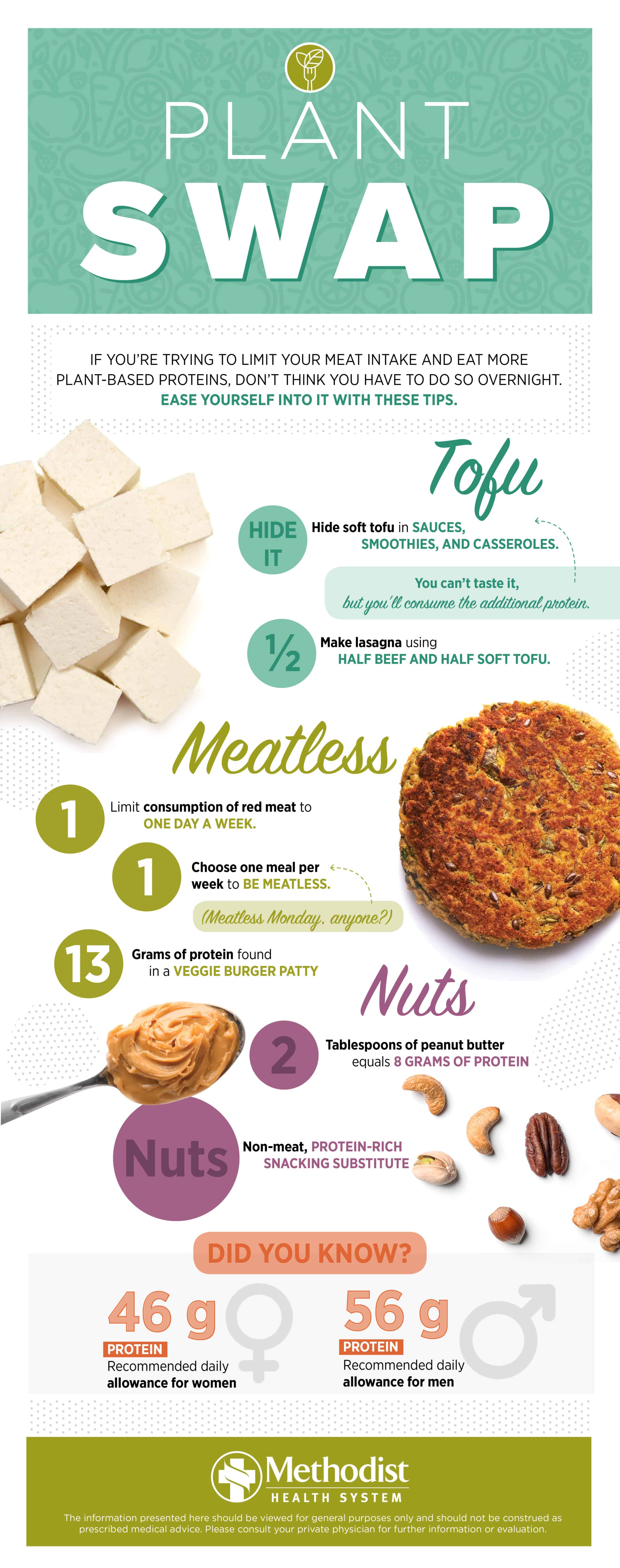Plant-based protein sources are becoming more popular, and for good reason — research has linked animal-based sources of protein to health problems such as dementia and heart disease.
Whether trying to cut back on carbon emissions, guilt, or waistlines, more people are choosing to eat plant-based foods. You may have even seen commercials for a meatless burger at your favorite fast-food restaurant. In 2018, plant-based food options posted double-digit sales growth across items such as yogurt, cheese, and meat alternatives.
— Carey Shore, MS, RD, LD, employee health coach at Methodist Health System
No matter the reason, eating more plant-based foods in place of animal-based products will vary the nutrient content of your diet and may help improve your overall health.
“Published research continues to show the benefits of plant-based diets,” says Carey Shore, MS, RD, LD, employee health coach at Methodist Health System. “Overconsumption of animal-based proteins has been linked to heart disease, cancer, and diabetes.”
Diets full of meat, eggs, and high-fat dairy products have also been linked to Alzheimer’s disease in multiple studies, and in 2015, the World Health Organization (WHO) declared processed meats to be cancer-causing agents. Red meat was also identified as a probable carcinogen by WHO.
“Red meat is one of the most concerning animal-based proteins,” Shore says. “It is often highlighted in the news and research.”
Plant-based kitchen creativity
Bringing more plant-based sources of protein into your diet can feel like a daunting task, but it is easier than you think. You can switch out many animal-based products with tasty and nutritious plant-based options.
“If you’re making a smoothie, replace regular yogurt or milk with soy-based, nut-based, or pea-based milk,” Shore says. “Try replacing meat toppings on your pizza with vegan products, such as vegan sausage or pepperoni. You can also use cauliflower crust, though make sure to check for eggs or milk in the ingredients.”
Grains and seeds are also a good way to incorporate more plant-based protein sources into your diet.
“Quinoa, sorghum, and farro have protein, as do flax and chia seeds,” Shore says.
Explore these additional ways to work plant-based sources of protein into your diet:
- Firm tofu can be scrambled or substituted for meat in a stirfry. Make sure to press out as much water as possible before cooking. Tofu can also be seasoned, marinated, and grilled like meat.
- Add nut butters to smoothies, sauces, and dips.
- Swap out eggs with black beans in your breakfast burrito, and use plant-based cheese in place of milk-based.
Realistic expectations
While plant-based sources of protein may benefit your health, Shore offers a word of caution to those who think the change will solve all of their health issues.
“Don’t think that eating plant-based proteins will necessarily result in weight loss,” she says. “Calories may be equal or higher for certain vegan food options, though there are plenty of other health benefits to make them worthwhile.”
Get Shine Online delivered to your inbox!


